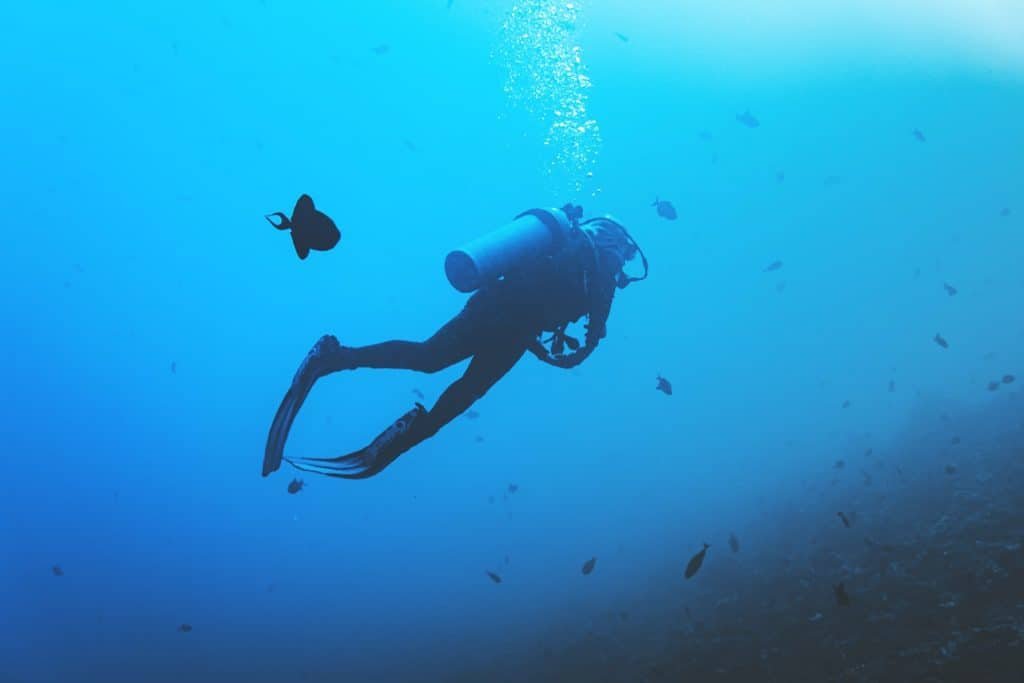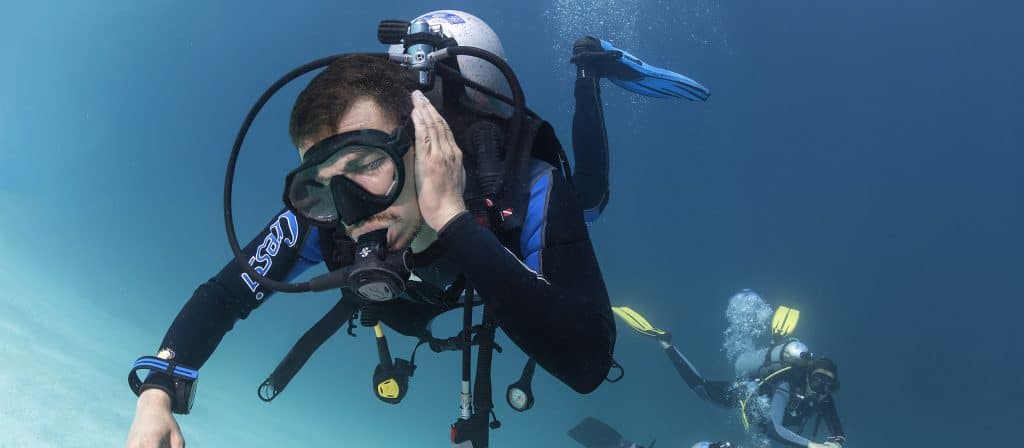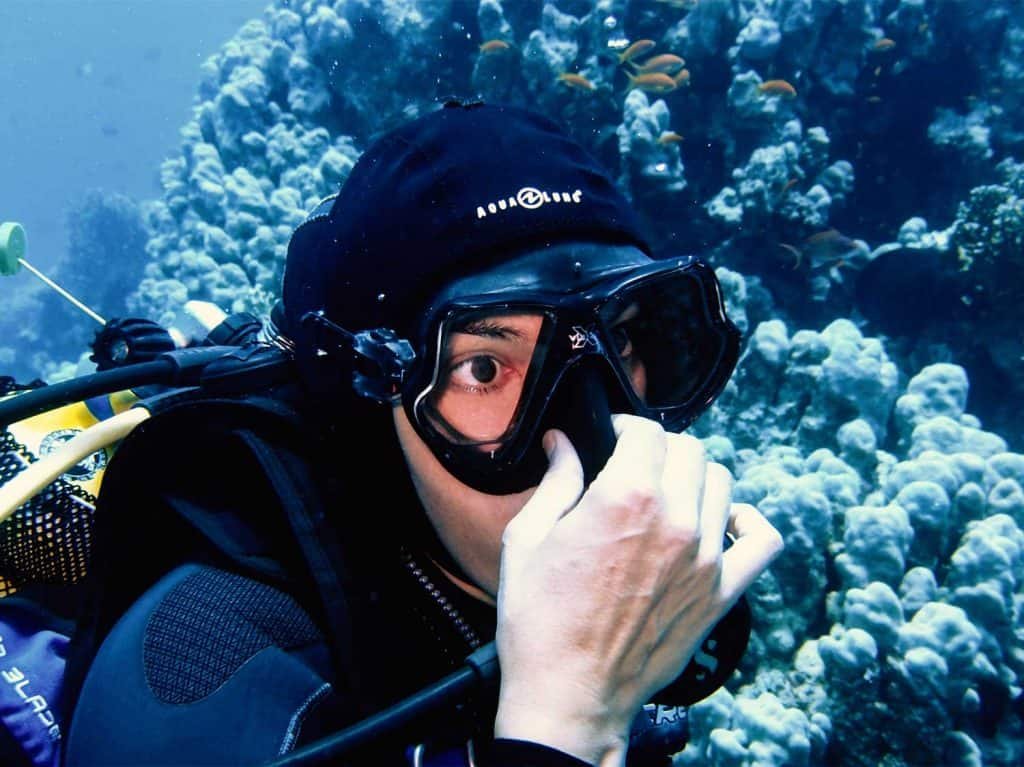Whenever we plunge into the water, our bodies experience various changes. We react to the pressure change, water consistency, and temperature. As we go deeper into the water, these factors take a toll on our bodies. Most of the time, many novice divers will experience ear problems during a scuba dive. In this post, we will discuss such ear problems and how to protect your ears when scuba diving.
The Physics of Diving

One thing that divers should understand before their first plunge is the science behind the activity. It’s not just a simple swim-down and swim-up process. A dive consists of inhaling specialized gas mixtures and adapting to the changing environment pressure.
Pressure changes based in depth. The deeper you get into the water, the higher the pressure becomes. Basically, your body will be carrying the weight of the water above you.
The pressure underwater increases by 1 atmosphere (ATA) for every 33 feet of depth. At the surface, what you feel is 1 ATA or the normal atmosphere on land. At 33 feet deep, you will be feeling 2 ATA and at 66 feet, it would be 3 ATA.
Remember that 1 ATA is equivalent to roughly 14.7 pounds per square inch (psi). So if you’re at a depth of 66 feet, your body is subject to the pressure of roughly 44 psi. To give you an idea, 44 psi is equivalent to the maximum inflation rate of a tire. Anything beyond it will increase the risk of a tire explosion.
Such pressure has a general effect on the body, but it’s instantly evident on the ears. For you to understand the context, let us explain how our ears work.
Our middle ear is a dead air space. When we dive, it will fail to adjust to the external pressure. This is the reason why we feel pain or discomfort as we descend. Fortunately, this problem is very easy to fix with proper equalization (more on this below).
Ear Injuries Associated with Scuba Diving

A lot of ear injuries may occur after a dive. Most of it is preventable with proper training and strategy. However, some ear injuries can take place even before the dive. It just so happened that the underwater pressure became the last straw that unraveled more symptoms.
Take note that about 29% of divers have to stop diving for long due to equalization problems. Also, about 6% of all divers have sustained permanent ear damage due to improper equalizing.
Such numbers are daunting, but if you know how to keep your ears protected when diving, you will not become a part of the statistics.
The following are some of the most common ear injuries divers sustain:
*Ear barotrauma
So far, ear barotrauma is one of the most common ear injuries that divers experience. This happens when the diver fails to equalize or did so poorly. Since the diver failed to equalize the pressure inside and outside the ear, his or her eardrum will bulge.
Aside from that, ear barotrauma will also cause fluids to leak into the middle ear. As you know, the middle ear is an empty space filled with air. When it gets filled with water, divers will feel a sense of fullness.
Take note that the deeper the dive, the worse ear barotrauma will be. After the dive, the person may experience temporary hearing loss, vertigo, and a risk of infection.
When you experience symptoms of ear barotrauma, you must consult a doctor right away.
*Ear infections
Ear infections can happen because of the dive or with other factors at play. After a diver experienced ear barotrauma, the fluids that entered the middle ear may trigger an infection.
Take note that the ear infection could occur before the actual dive. It just happened that the saltwater filling up the middle ear worsened the situation.
No matter what the cause is, you should always seek medical attention to treat the infection.
*Swimmer’s ear
Swimmer’s ear or Otitis externa is a condition that affects the outer ear. This occurs when water remained trapped within the ear canal.
Since the human body is warm, the moisture on the ear canal will start to form a bacterial infection. This will spread to the surrounding tissues, which can cause itching, swelling, redness, and other advanced symptoms.
This condition requires medical attention. An unattended ear infection will worsen and cause more health problems along the way.
How to Perform Ear Equalization

Ear equalization is the key to prevent almost all ear injuries related to diving. During a dive lesson, the instructor will teach how to equalize underwater. If you’re yet to learn such a skill, we will discuss here the steps on how to do so.
Step 1. Start before the dive
Before you plunge, swallow your saliva and listen for the ‘pop’ in your ears. The popping sound is a sign that your Eustachian tube is open and prepared for equalization underwater.
Step 2. Descend with your feet
If you’re prone to ear problems, it’s best to dive with your feet instead of head first. The Valsalva or Toynbee maneuver (equalization methods) are 50% easier to do if you dive with your feet.
Step 3. Equalize
At a depth of 15 feet, you should perform your first ear equalization. Don’t descend any further until you have equalized at this depth.
To equalize, look up, pinch your nose, then try to blow your nose. Do so gently until you feel the pain or pressure in your ear ease. Looking up will open your Eustachian tubes and make it easier for you to equalize.
If your Eustachian tubes are too tight for equalization, ascend a little until it gets loose.
If your ears feel painful, it’s a sign that you have to equalize. You should never descend further in pain. Doing so will only put you on harm’s way. You must always listen to your body.
Step 4. Equalize multiple times
Take note that you have to equalize multiple times during your descend and ascend. The rule of thumb is to do so every 2 to 3 meters. Besides, equalization can be done in a matter of seconds. Also, you must equalize as well during your ascent together with decompression stops if need be.
How to Protect Your Ears When Scuba Diving
Your ears are one of the gentlest parts of the body. It’s home to the smallest bones of our bodies, which require proper care on every dive.
The good thing is that most ear injuries during a dive are preventable. You should keep the following points in mind:
*Don’t dive if you have a cold or flu
One of the mistakes divers do is taking a plunge when they have a cold or flu. Having colds will block your nose and make it almost impossible to equalize. This will make your condition worse, especially if the water temperature is cold.
One of the rules of diving is you should never take a plunge when you’re sick. It’s never too late to cancel a dive if you’re not in good shape. Your fellow divers will understand if you can’t join the plunge on short notice.
*Don’t descend or ascend too fast
Descending and ascending too fast isn’t just a guaranteed cause if barotrauma, but of decompression illness as well. According to experts, you should never descend faster than 66 feet per minute. It’s always safer to descend slower as long as it will not consume too much of your air supply.
Meanwhile, you should also observe proper ascent speed. Ascending is much critical as your body should adapt to the changing pressure slowly. Shooting to the surface at fast speeds will shock your body and possibly cause your lungs to collapse. Take note that decompression illness can be very fatal within minutes.
Dives beyond 40 meters should observe decompression stops during the ascent. This is a required process that you should do at 15 feet deep for at least 5-10 minutes. Very deep dives need to conduct multiple decompression stops with longer durations.
*Go for regular ear check-ups
One of the most effective ways to prevent and combat ear injuries during a dive is to consult a doctor regularly. If you feel any ear pain or discomfort after a dive, you must get it checked by a physician.
This way, your condition will be diagnosed and treated properly. It’s very crucial for ear infections which can worsen over time.
*Don’t drink and dive
It’s a sin to drink during a dive day. If you plan to join a scuba dive, especially deep ones, you must stay sober a few days before the actual plunge.
Your senses go haywire when you are drunk. Pair that with the underwater pressure and you’re in trouble. When you do this, you’ll also compromise the safety of your dive buddy. Aside from that, you may have a hard time equalizing.
*Always practice
For novice divers, practice always goes a long way in equalizing your ears. You can practice it at the pool where the environment is much controlled. This way, you can assess the feeling on your ear and how you can equalize.
After that, you can go on shallow dives to keep practicing how to keep your ears from hurting while diving. Do this until you’re comfortable equalizing multiple times on deeper dives.
*Listen to your body
If you feel any ear pain during or after the dive, you shouldn’t dismiss it as mere discomfort. Always have it checked. If it happened underwater, don’t hesitate to abort the dive if the pain is starting to become unbearable.
Also, you can cancel a dive if you feel that something’s wrong with your ears. Such a problem might make it impossible for you to equalize. When this happens, you will face a big problem, especially on deep dives.
*Don’t wear earplugs
Although, wearing earplugs when snorkeling is ok, wearing them during a dive is a big mistake. The plugs will create a space within your ear canal that’s impossible to equalize. Basically, it will block your ears from adjusting with the external pressure of the underwater. Worse, hydrostatic will suck the earplugs closer to your ear canal, making it very challenging to remove underwater.
If you want protection for your ears, you can consider using a scuba hood instead. If the hood is properly sized, it wouldn’t cause any equalizing issues on your dive.
Frequently Asked Questions
Q: How will I know if my eardrum burst due to diving?
A: A ruptured eardrum, no matter what the cause is, would result in intense ear pain, vertigo, nausea, hearing loss, tinnitus, and even blood or mucus-like discharge from the ear. When this happens, you must go to the doctor right away.
Q: How long will my blocked ears last?
A: Depending on if you have an infection or not, clogged ears can go away in a matter of hours or up to weeks. As long as your ears are blocked, you should never go for a dive. It would be impossible and dangerous to equalize with blocked ears.
Q: What will happen if I don’t equalize during a scuba dive?
A: If you don’t equalize during a dive, you may suffer from ear pain. On deep dives, your eardrums may burst and cause permanent damage to your ears. Take note that once your Eustachian tube closes due to underwater pressure, there’s no way to open it but to ascend. This is why equalizing multiple times as you descend is a must.
Q: Do earplugs help divers?
A: Earplugs should never be used by divers. Earplugs block your ears and make it impossible to equalize. As much as it’s used for protection, it’s not considered a diving gear. It can do more harm than help during a dive.
Final Words
Knowing how to protect your ears when scuba diving will save you from pain. Above all, it will keep you safe during your dive, especially on very challenging depths. Every diver, regardless of level, should know how to equalize properly. Practice will help a lot together with proper training from a reputable dive instructor.
